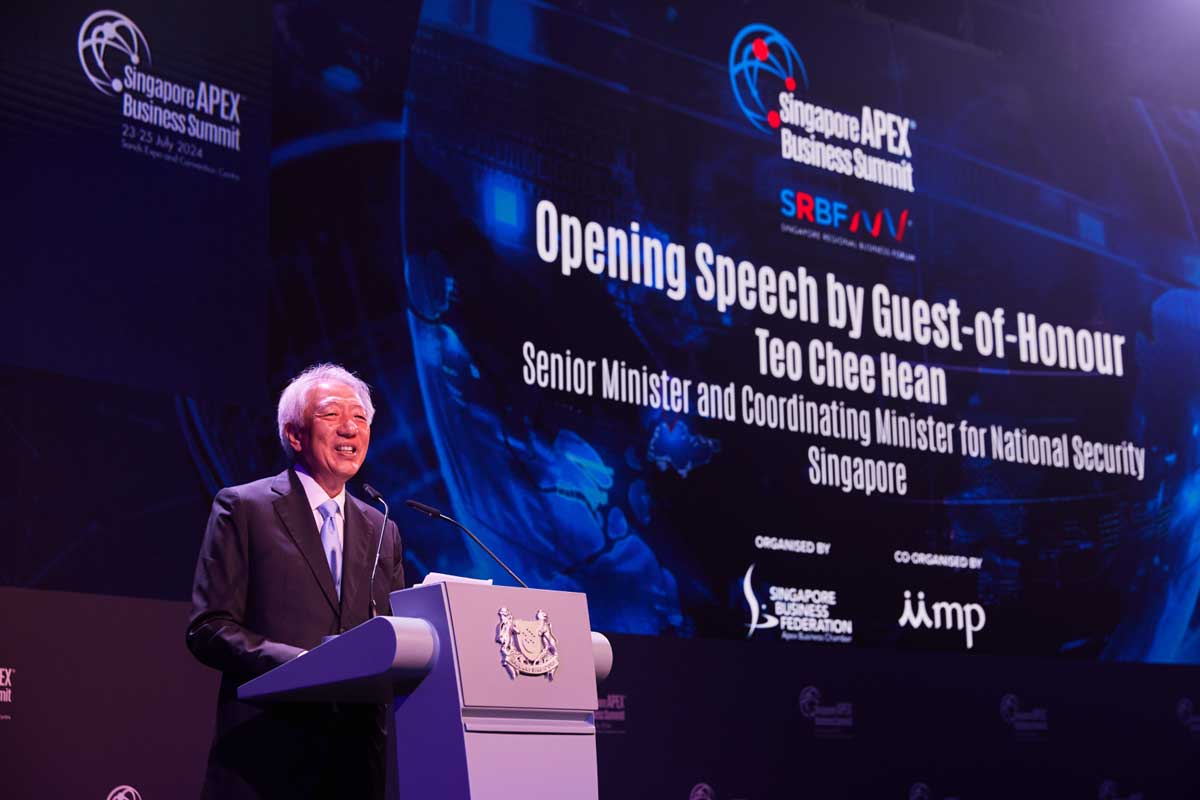
Senior Minister Teo Chee Hean spoke on keeping costs for businesses in check at the Singapore Apex Business Summit 2024.
Date published: 24 July 2024
Keeping costs for businesses in check – that’s what the Singapore government is doing to help shape a more resilient business environment, regionally, and globally. Senior Minister and Coordinating Minister for National Security, Teo Chee Hean, outlined three
ways Singapore government is achieving this:
- Continuing to encourage collaboration toward a more integrated world with regional and cross-regional agreements
- Creating partnerships in new domains that represent the future of business such as the digital and green economies
- Helping to lay the foundation for critical new infrastructure that will support regional trading and resilience
Addressing an audience of senior business leaders, diplomats, through leaders and senior government officials this morning, at the 8th edition of the Singapore Regional Business Federation on day 2 of the Singapore Apex Business Summit, SM Teo underscored the significant growth potential of the digital economy. Highlighting its significant growth potentials of digital economy. He shared that digital economy accounted for 17.3% of Singapore’s GDP in 2022, up from 13% in 2017, with its growth outpacing that of the overall economy.
Furthermore, Singapore has proactively fostered the green economy by forging agreements and MOUs with countries like Australia, the UK, Chile and Japan that support economic growth and create jobs in green sectors, while encouraging the decarbonisation of economic activities.
Singapore also has ongoing collaborations and discussions to trade carbon credits with 19 countries, including five countries with which Singapore has formally signed or substantively concluded negotiations on implementation agreements.
SM Teo further spoke about the ASEAN power grid to improve regional resilience in power supply, especially green power. He announced the Singapore government has granted conditional approval for 4.2 GW of low-carbon electricity imports. Singapore was already importing power from Laos - the first multilateral cross-border electricity trade involving four ASEAN countries.
Beyond cross-border electricity trade, SM Teo also shared about expanding cross-border digital payment infrastructure. Over the past three years, Singapore has gone beyond establishing cross-border QR and real-time payment systems with Thailand, Malaysia, Indonesia, and India. Currently, efforts are underway to establish a singe common system with India, Malaysia, Thailand and Philippines.
Dilhan Pillay Sandrasegara, Executive Director and CEO of Temasek Holdings and Temasek International, the keynote speaker, share that while there had been many discussions on de-risking and de-coupling of economies, Singaporean businesses had to re-imagine ASEAN’s roles value in terms of globalisation and global value chains.
Furthermore, the Green Economy offers significant opportunities for ASEAN. However, Mr Pillay cautioned that energy transition will pose challenging. He explained that in developing economies, energy transition is closely linked to energy security, particularly in light of geopolitical uncertainties. On the other hand, in developing markets, the transition to cleaner energy source is primarily about ensuring energy remains affordable, presenting a complex, long term challenge spanning decades.
Mr. Pillay said he saw “a need for government, big companies and SMEs to come together to see how they can build resilience in the ecosystems that we have going for us in Singapore, especially in the context of a very different world”.
